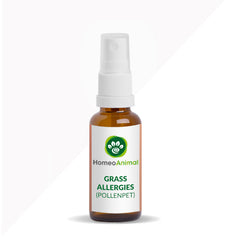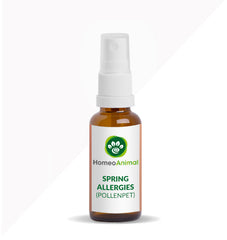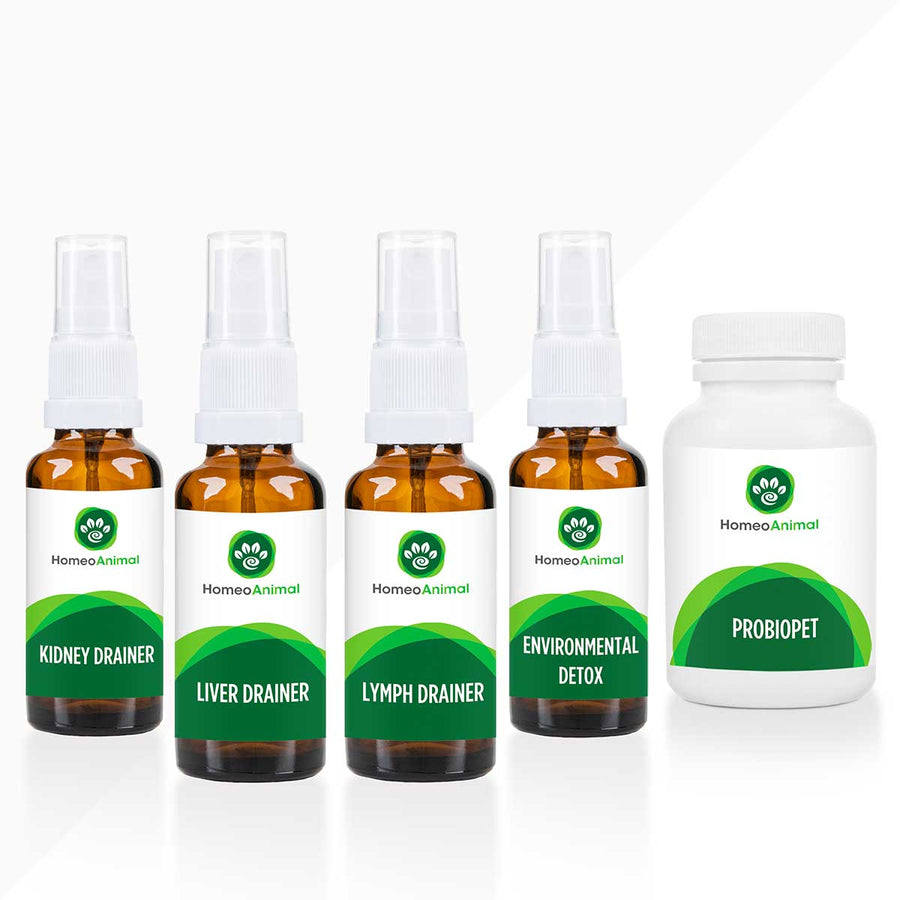What HOME REMEDIES Can I Give My Dog For Allergies?
How can I help my dog with allergies?
You might ask yourself "What can I give my dog for allergies?". You can treat you dog with antihistamines, special shampoos, fatty acid supplements, steroids, immunosuppressive drugs. You can also consider natural home remedies specially made to relieve allergies in dogs such as oats, probiotics, chamomile and some homeopathic products. But firstly it is ideal to determine what your dog is allergic to. The most common allergens for dogs are fleas, food, dust, dust mites and inhalant allergens such as pollen, grass, tress, mol and, spores.
Many pet owners will say that the most frustrating problem a pet can have is allergies. Allergies very rarely go away. That doesn't mean that there is nothing that can be done for your furry family members - quite the opposite really. There are many options for animals with allergies. We will help you to know how to get rid of dog allergies. Show you how to help your dog naturally.
-
Click to learn more : 👉 Natural product during your dog SEASONAL ALLERGIES 🐶
A human's allergic "organ", so to speak, is primarily their respiratory track. So when we have allergies, we usually cough, sneeze, have runny eyes, or trouble breathing if the allergic reaction is severe enough. A dog's allergic "organ" is primarily their skin, so they scratch or get hives or whelps if the allergic reaction is acute. Humans can have allergic issues with their skin and dogs can have allergic issues with their respiratory track. This article will focus on the most common manifestations of allergies in dogs = Skin problems.
Just like human allergies, there are varying degrees of severity. Some dogs just scratch a little more in the spring for a couple days, when the pollen gets bad, just like some people start just a little coughing and sneezing, but not even enough to pop an antihistamine. Then some animals scratch incessantly year round to the point where they cause life-threatening secondary skin infections.
-
READ ALSO: 👉What Can Help If Your Pet Is Suffering From ...
THE MAIN OFFENDERS = ALLERGENS
Dogs can have an allergic reaction to almost anything they come into contact with. The most common allergens for dogs are: fleas, food, dust and dust mites, and "inhalant" allergens (pollen, grass, trees, mold spores, etc). Many allergic dogs, especially severely allergic dogs, are allergic to more than one of these.
It is ideal to determine what your dog is allergic to. This is usually not simple. Your dog's "itch pattern" may help a little to determine what he or she is allergic to. In general, dog's with flea allergies scratch over their tail head, on their back. In general, dog's with food allergies have itchy "ears and rears". Canine inhalant allergy sufferers tend to gnaw on their feet more that other areas. Don't determine what your dog is allergic to strictly by his or her itch pattern, but it's a good starting place. For instance, if your pet has a really hard time only over his tail head, get rid of every flea on him. I stress, EVERY flea, because even one single flea bite can start the whole itch cycle all over on a dog that is allergic to them.
FOOD MATTERS = HYPOALLERGENIC DIET
Work with your veterinarian to find a truly hypoallergenic diet because many dog foods claim to be, but are not. It is also important to look at the ingredients in the food(s) you have been feeding that the dog has not done well on and avoid certain ingredients -- changing the protein source and avoiding corn and wheat are usually good places to start. A food trial with the hypoallergenic diet should last no less than 8 weeks! Absolutely nothing else, except water, should pass through your dog's lips during the food trial (no treats, no people food, no sneaking the cat's food, change to a heartworm preventative that is not a chewable treat, etc).
I had a patient that turned out to be exclusively food allergic, which is kind of odd because like I mentioned earlier, allergic animal are usually allergic to multiple allergens. So I suggested a really expensive and very good hypoallergenic diet. The dog didn’t improve at all over the eight week food trial. The owner and I were both ready to try something else when she told me that she didn’t think that this really mattered but her dog loved eating cat poop. She was wildly embarrassed (which she shouldn’t have been, especially with me, because it is very common). Cats have a very high protein requirement so their food is chock full of allergens, which makes cat poop pretty darn allergenic! When we finally outsmarted Jackson and figured out how to keep him out of the litter box, his skin improved dramatically.
Multiple food trials may be necessary to fully rule out a food allergy. For example, you may have been feeding a chicken based diet and choose to do your first food trial with lamb. Your dog could be allergic to both, necessitating a change to a different protein. Lamb isn't really a good choice for a food trial (for a lot of reasons, but that's a topic for another discussion) primarily because it is moderately allergenic. Dermatologists usually recommend a really "novel" protein, like venison, duck, rabbit, salmon or bison.
So now what, after weeks of these feeding trials? Your dog needs some relief! And it's ok (and usually necessary) to provide relief while you are doing your feeding trial, especially in the beginning. Keep in mind that the dog will usually improve with the symptomatic treatment, so don't let that cause you to believe a certain food is working. Also remember that dogs are often allergic to multiple different allergens (fleas, food, dust mites, pollen, etc) so even if your dog is just somewhat improved, you will probably want to continue with the hypoallergenic diet.
EXACTLY! WHAT? IS MY DOG ALLERGIC TO = ALLERGY TESTING
It is possible to allergy test your dog. The gold standard for testing is usually going to a board certified veterinary dermatologist and having them perform intradermal skin testing on your dog. As you might imagine, the dog will need to go under anesthesia for this procedure. As you might also imagine, this is relatively expensive. There are pretty simple allergy blood tests available now that are getting more reliable and accurate. All the allergy blood test involves is your dog giving a little blood and your veterinarian sending it off to a lab. It isn't cheap either though, because with either intradermal skin testing or the blood tests, your ultimate goal is to have the lab formulate "allergy shots" (desensitization injections) specific for your individual animal.
Relief is on the way ...
What can you give your dog for allergies?
DOG ALLERGIES TREATMENTS AND RELIEF FOR DOGS
"How can I help my dog with allergies?" Treating allergies can be frustrating for the owner, the veterinarian, and most of all for the poor dog. It is important for owners to realize (and for veterinarians to make sure they inform owners) that allergies don't usually go away, we primarily treat the symptoms. It will seem like they go away because the animal will usually improve with treatment, but once treatment is stopped and the animal continues to come into contact with what it is allergic to, it will scratch again.
How to treat dog allergies
- Antihistamines
- Medicated shampoos that sooth the skin
- Fatty acid supplements
- Steroids (prednisone, prenisolone, hydrocortisone)
- Immunosuppressive drugs
- Natural remedies (homeopathy, oats, probiotics & chamomille)
Are over-the-counter medications safe for my dog?
How to get rid of dog allergies? As a general rule, it is not recommended to use over-the-counter medications from your pharmacist for your dog. However, under the instruction of your vet, some products could provide relief for your dog, if you follow the dosage prescribed by an animal health professional.
For example, some over-the-counter antihistamines can be used for dogs, under certain conditions.
ANTIHISTAMINES FOR DOGS
Antihistamines are a good place to start with treatment. They have minimal side effects (will usually just cause drowsiness) and they help block histamine release which is causing the itching. This sounds like they should work perfectly for allergic animals but they usually just provide a little relief for mild to moderate allergy sufferers. It will seem like they don't help the severely allergic animal at all, but since they have minimal side effects (and can work synergistically with other medications) it is usually suggested that an allergic animal stay on them even when adding stronger medications.
Be sure to work with your veterinarian to calculate the perfect dosage for your pet -- dogs have a much higher dosage requirement when it comes to antihistamines. For example, a 25 pound cocker spaniel will usually need one entire adult 25 mg Benadryl (diphenhydramine) up to three times a day. Underdosing may be one of the reasons antihistamines seem like they don't work very well for pets. When one antihistamine seems to not be working very well, you can try switching to another one.
Above all, be sure to check with your vet that the medication you have on hand is not toxic for your dog.
SHAMPOOS FOR DOGS
Special shampoos can help soothe and heal certain skin conditions. Work with your veterinarian to determine a shampoo that is right for your dog because the wrong shampoo can deplete important fatty acids from the skin, making it dry and itchier than it was in the first place. If your dog has a secondary skin infection, a medicated shampoo will usually be a good choice. It is usually possible to determine if the skin infection is caused by bacteria vs. fungal (yeast) organisms, and thus making your choice for a shampoo more appropriate and ultimately more effective for your dog. Most secondary skin infections have both bacterial and fungal components, so thankfully there are many good, strong shampoos with antibacterial and antifungal properties.
Always follow the label on the bottle, but in general, soaping your dog up and letting the medicated shampoo sit for at least 10 minutes improves its efficacy. Oral antibiotics may be prescribed if the secondary skin infection is bad enough. Now is a good time to mention keeping hypoallergenic baby wipes near the door and wiping your pet's feet when the pollen is really bad outside. Some dermatologists support this and others say that the pollen that you can see is usually not the offending organism but hey, it's simple and free!
FATTY ACID SUPPLEMENTS FOR DOGS
One last, relatively benign (meaning no real side effects), treatment option for dogs are fatty acid supplements. Pick one that is formulated for dogs as they have different fatty acid requirements than humans do, so it's hard, if not impossible, to just pour some vegetable oil over their food and “get it right”. You usually won't notice anything too dramatic in the way of improvement, but it will help.
I had a client once that swore the liquid fatty acid supplement I started her dog on was making the dog’s skin much worse and, sure enough, I was looking at him and his skin was definitely worse. I was thinking we were going to have to try something stronger for him until she showed me how she really rubbed the liquid fatty acids into his skin twice a day!?! There are a few topical fatty acid preparations, but the majority, like the one I started her dog on, are supposed to be given ORALLY, so be sure to listen carefully and read labels carefully.
MEDICATION FOR DOG ALLERGIES
STEROIDS FOR DOGS
So what's next? You have done a couple food trials, you are keeping all the fleas off, you have tried antihistamines, fatty acids and medicated shampoos and your dog is still miserable. Most veterinarians will recommend a short course of steroids at this point. If the dog continues to dig at their skin and keeps it secondarily infected, the itch cycle won't stop because the dog is now scratching at the secondary infection AND the underlying allergy.
Steroids (prednisone, prenisolone, hydrocortisone) work very nicely and quickly to provide relief, but don't get too excited because steroids, like with people, have side effects (dog will drink more, urinate more, may have accidents in the house, increased appetite, may predispose to Diabetes, may predispose to Cushings disease). Using the lowest possible dosage to provide relief is the objective. Work with your veterinarian to find the perfect dosage for your dog.
Continuing antihistamines when you add the steroids is usually a good idea because the two work together to give the dog more than just an additive effect from the two medications. You can also wean the dog off of the steroids faster as a general rule. Continuing the fatty acid supplements is also a good idea for the same reason.
NEW IMMUNOSUPPRESSIVE DRUGS
Steroids work because they suppress the dog's excessive immune response to allergens. Veterinary dermatologists have been searching for different drugs that calm down the dog's immune response that don't have as many side effects as steroids tend to. Two relatively new drugs seem promising : Atopica (Cyclosporine) and Apoquel (Oclacitinib). They have drawbacks as well: they are much more expensive than steroids and Apoquel has been so popular this year, it has been backordered. Ask your veterinarian if these might be a good idea for your dog.
Cytopoint subcutaneous injections can also help your dog with allergies and associated skin irritations. The injections are usually monthly, but the frequency may vary depending on the severity of your dog's symptoms. Cytopoint is also expensive, but is an alternative to daily tablet administration.
HOW TO HELP MY DOG WHO SUFFERS FROM ALLERGIES AT HOME NATURALLY
Now may be the time to try homeopathy. Or starting with homeopathy and attempting to avoid the long battle with allergies described above is also an excellent option. The “Allergy Seasonal” or “Food Allergy” products are good starting options if your dog has either of these to bring support to the whole body against allergens. If your dog has a problem with inhalant allergens like pollen, grass, trees, mold spores, etc, consider trying “Atopic Dermatitis”.
 Check out this testimonial that we recently received from someone who uses our “Allergy Seasonal” package:
Check out this testimonial that we recently received from someone who uses our “Allergy Seasonal” package:
"Finally, something that actually worked! I would recommend this highly if your dog has allergies where the skin can become infected. Discuss the issues with Zumalka rep and they will guide you to the proper formula based on your dog’s info. ... Definitely worth it considering her allergy med was costing around $50 a month!!"
Still not ready for the big packages? These are good options as well, depending on your dog’s symptoms: Dust Mite Allergy (which is much more common than you might think), Itching, Anti-inflammatory, Alopecia (Hair loss), Ear Infection(Otitis), Fleas (bites), Flea (itching), Beautiful Coat, Eczema (general term for skin inflammation and irritation), Seborrhea (two types = oily or greasy and dry or flaky), and Ticks & Fleas.
You can continue reading to find other natural products for your dogs suffering from allergies.
Natural Home Remedies for Dog Allergies
Aside from the homeopathic remedies mentioned above, there are other natural remedies to relieve your dog's allergy symptoms. I am thinking, for example, of oats, probiotics and chamomile.
Oats as a natural remedy for dog allergies
Does your dog have irritated and red pads? You could grind oats into a fine powder and mix with a little water to make a poultice to apply to the affected areas. If your dog tolerates bathing, you can also add this potion to slightly warm bath water and soak the feet for five to ten minutes.
The advantage of oats? It both works and is non-toxic to dogs if swallowed.
Probiotics for dog allergies?
You read that correctly. Since some dogs develop gastrointestinal symptoms when they suffer from allergies, such as chronic diarrhea or loose stools, it is worth adding a source of probiotics to their diet to help them. Plain yogurt can be used, for example, as a treat for your dog.
You can also get dog probiotics to ensure success.
Chamomile to relieve my dog's allergy symptoms?
Are you the type to pour yourself a cup of chamomile tea before going to bed?
Next time, consider pouring some of this beverage into a spray bottle and let it sit in the fridge. Once cooled, you can spray this remedy on your dog’s red and irritated skin to relieve it.
GRASS ALLERGIES (POLLENPET)
 If your dog has environmental allergies, especially in spring and summer, it is possibly a reaction to grass pollen. Grasses (Gramineae) are hollow stem plants that often have spiky fruits.
If your dog has environmental allergies, especially in spring and summer, it is possibly a reaction to grass pollen. Grasses (Gramineae) are hollow stem plants that often have spiky fruits.
This natural GRASS ALLERGIES (POLLENPET) product helps support your dog during the symptoms of allergies linked specifically to the pollen of this plant family. It can be very useful when the allergies comes from ryegrass, timothy grass (Phleum Pratense), common horsetail (Equisetum Arvense) and cat grass (Dactylis Glomerata).
SPRING ALLERGIES (POLLENPET)
 This natural product helps your dog that is suffering from spring allergy symptoms. During this period, the main allergens in the air are pollen from white birch (I can attest to that!), white willow, black alder and hazel.
This natural product helps your dog that is suffering from spring allergy symptoms. During this period, the main allergens in the air are pollen from white birch (I can attest to that!), white willow, black alder and hazel.
The SPRING ALLERGIES (POLLENPET) product directly helps support your dog during these four pollens responsible for allergies in spring. It consists of an extract from these plants and therefore helps to desensitize your dog's body to these allergens.
Giving this product to your dog will help with itchiness and calm redness of the skin.
TREE ALLERGIES (POLLENPET)
 If your dog seems to have an allergy to trees, this product is for him. It helps with allergies to five trees: elderberry, English oak, field elm, black poplar and field maple.
If your dog seems to have an allergy to trees, this product is for him. It helps with allergies to five trees: elderberry, English oak, field elm, black poplar and field maple.
Again, the TREE ALLERGIES (POLLENPET) product can help in cases of allergic reactions naturally by allowing your dog's body to become desensitized to each of these allergens.
Your dog will be helped when sneezing, will have clearer eyes and sinuses, and will have more regular, formed stools.
These three natural products mentioned above are part of our POLLENPET collection and are excellent when used alone. However, if you want an optimal effect, when used in combination with the SEASONAL ALLERGY KIT, you will have a complete toolkit for allergies. In fact, this set of products helps support all the organs necessary for the efficient evacuation of toxins, and therefore allergens.






Mr H my dog has allergies to which he was put on steroids 1/2 tablet per day he is a jug crossbreed … the thing is I can’t get him off these I reduce them down to a 1/4 tablet and he is fine for about a fortnight then he stays with Gasto problems ! He has good allergies and environmental .. what I’m worried about is his weight gain and I can’t seem to reduce it I have tied all sorts ….. he is also on a raw diet pork&oily fish …can’t have grains of any sort …. I get so scared because of his weight gain as he eats less than 300gms per day ! What else can I do can you please advise . Many thanks ….
Leave a comment